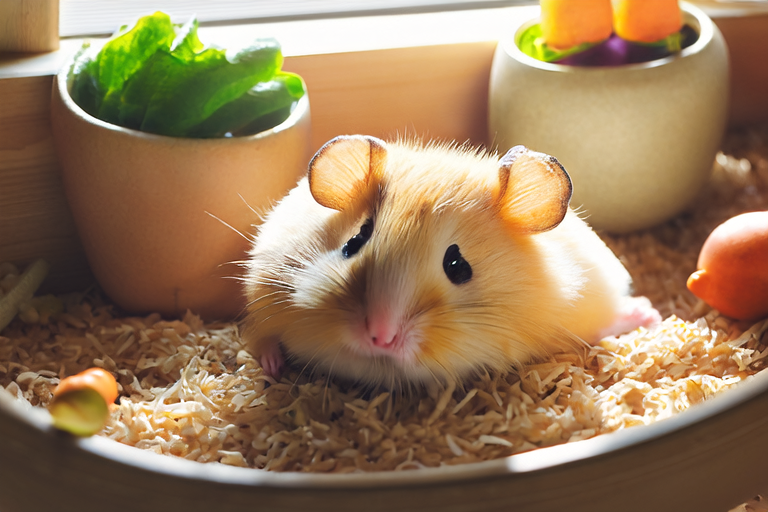Golden Hamsters: The Ultimate Guide for First-Time Owners
Welcome to the world of golden hamsters! These adorable creatures make wonderful pets for first-time owners. With this comprehensive guide, you’ll learn everything you need to know about caring for your new furry friend.
Selecting the Right Cage
The first step in providing a happy home for your golden hamster is choosing the right cage. Opt for a spacious wire cage with multiple levels, as it allows your pet to climb and explore. Ensure that the cage has a solid floor to prevent injuries from sharp wires. A minimum size of 45cm x 30cm x 30cm (18″ x 12″ x 12″) is recommended.
Housing Your Golden Hamster
Line the cage with bedding made from natural materials like aspen shavings or paper-based products. Avoid cedar or pine shavings, as they can be harmful to your hamster’s respiratory system. Place the cage in a quiet area away from direct sunlight and drafts. Ensure there are no gaps between the bars where your hamster could squeeze through.
Diet and Nutrition
Your golden hamster requires a balanced diet consisting of commercial hamster food, fresh vegetables, fruits, and occasional treats. Provide a constant supply of clean water. Offer fresh vegetables like carrots, broccoli, and spinach, and fruits such as apples and berries. Treats should be given sparingly to avoid obesity.
Health Care
Regular check-ups with a veterinarian who specializes in small animals are crucial for maintaining your hamster’s health. Monitor their weight, coat, and behavior regularly. Signs of illness include lethargy, loss of appetite, diarrhea, or labored breathing. Clean the cage weekly to prevent the buildup of bacteria and ensure your hamster’s environment remains hygienic.
Exercise Needs
Golden hamsters are active creatures that require regular exercise. Provide an exercise wheel, tunnels, and chew toys to keep them entertained. Rotate toys periodically to maintain their interest and provide mental stimulation. Ensure that the exercise wheel has a solid surface to prevent foot injuries.
Grooming
Grooming is essential for your golden hamster’s well-being. Brush their fur gently with a soft brush to remove loose hair and prevent matting. Trim their nails if necessary, but be cautious not to cut too close to the quick, which can cause bleeding. Clean their ears and eyes with a damp cotton ball if needed.
Common Behaviors
Golden hamsters are nocturnal, so they are most active during the evening and night. They may burrow into their bedding to create nests or hideaways. Some hamsters enjoy interacting with their owners, while others prefer solitude. Respect your hamster’s preferences and provide ample hiding spots if they feel stressed.
Tips for Handling and Training
Handling your golden hamster gently and frequently will help build trust. Always support their body when holding them and avoid sudden movements. Use treats to encourage positive behaviors, such as coming out of their cage when called. Never pick up your hamster by the tail, as it can lead to injury.
Selecting Toys and Accessories
Toys and accessories can enrich your hamster’s life and provide mental stimulation. Consider adding tunnels, hammocks, and chew toys to their cage. Hide-and-seek games with treats can also entertain your hamster. Ensure all toys are safe and appropriate for small animals.
Tackling Typical Challenges
New owners may encounter challenges such as biting, territorial behavior, or difficulty in handling. Patience and consistency are key. If your hamster bites, it may be due to fear or discomfort. Gently handle your hamster more often to build trust. If your hamster becomes territorial, provide additional hiding spots and rearrange the cage occasionally to reduce stress.
Frequently Asked Questions
- How often should I feed my golden hamster?
Feed your hamster once daily, offering a mix of commercial hamster food, fresh vegetables, and occasional fruits. - Can I keep multiple hamsters together?
Golden hamsters are solitary animals and should be kept individually to prevent fighting. - What signs indicate my hamster is sick?
Signs of illness include lethargy, loss of appetite, diarrhea, or labored breathing. Consult a veterinarian immediately if you notice any of these symptoms.
Caring for a golden hamster is a rewarding experience. By following these guidelines, you’ll provide your pet with a healthy, happy environment. Enjoy the journey of building a strong bond with your new furry friend!
